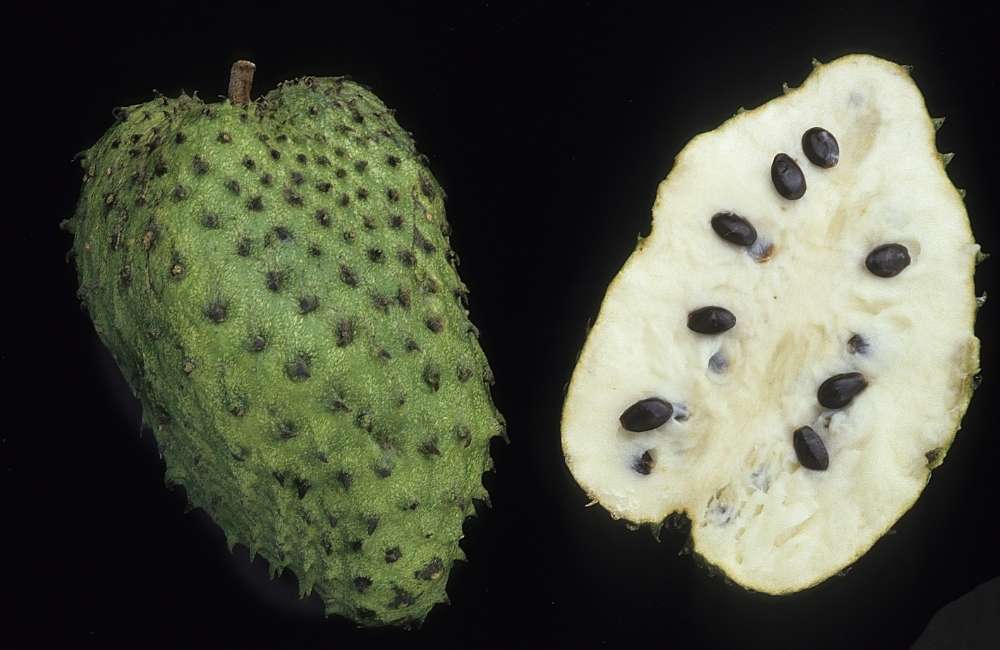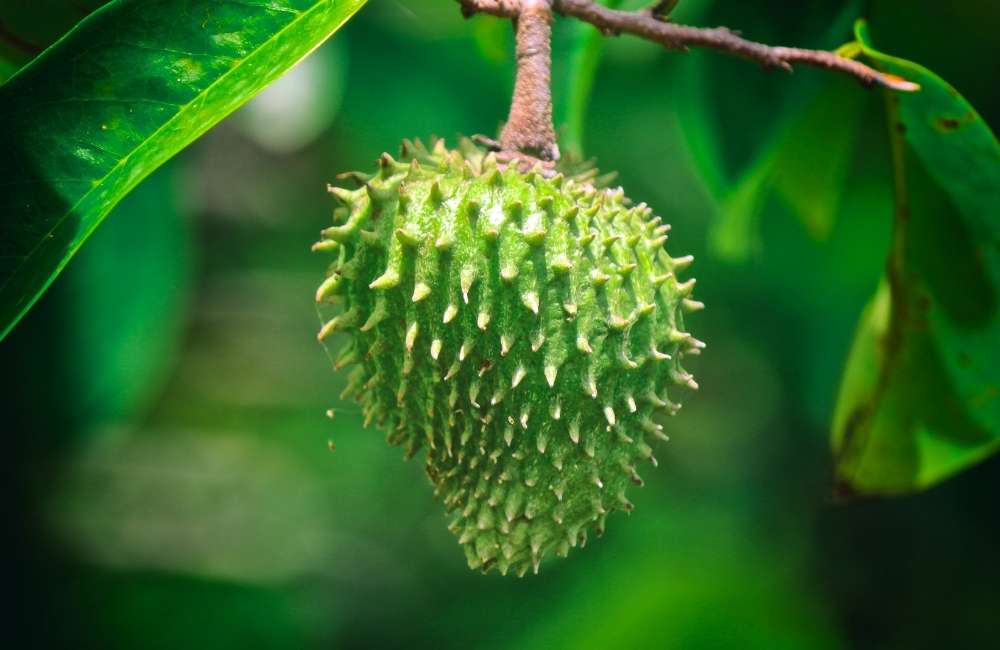Soursop (Family; Annona muricata L.) plant is a small perennial branched, quick-growing tropical fruit tree, native to South American countries (Mexico, Brazil, Cuba, Peru, and Venezuela).
However, this plant is widely cultivated in South East Asia, the Pacific regions, and West and North Africa. The tree reaches a height of 7.5-9m, has low branching, and is slender. Young branchlets are hairy and rusty in colour.
Soursop is also known as Graviola in Brazil, and its other names are guanabana.
More About the Parts of Soursop Plants
1. Soursop Fruit
Soursop produces the largest fruit among the Annonaceae family, ranging from 10-30 cm long and up to 15cm wide with a weight of about 4.5-6.8 kg when matured. The fruit is ideally oval or heart-shaped but can be lopsided or curved due to poor pollination or insect injury.
The compound fruit is covered with an inedible dark green leathery skin that becomes yellow-green, soft, thin and tender when ripe. The skin is covered with protruding soft, elongated, curved, and pliable spines that easily snap when the fruit is fully ripe.
The cream-coloured inner surface of the skin is granular and separates easily from the flesh. The pulp has a unique taste; a pleasant blend of sweet and sub-acid flavours with a musky pineapple-like aroma. The pulp is fibrous and juicy.
A single fruit may contain as many as 100 seeds or even more.
2. Soursop Leaves
The oblong leaves grow alternately, are normally evergreen, smooth, glossy and dark green, on the upper surface while light green underneath, and are 6.25-20cm long and 2.5-6.25cm wide.
3. The Bark and Root of Soursop
Though these are not our areas of interest it is good to mention that the bark is considered toxic and contains potentially poisonous compounds like online, muricine, and hydrocyanic acid.
The root system consists of 1.5-1.8m long taproot and abundant lateral roots. The taproot does not grow as deep as other tropical fruit trees like mango.
Let us have a look at what makes this plant a wonder! We are looking at a tree that bears nutritious fruits and at the same time, the leaves can be used for their medicinal properties in treating many ailments.
Let us consider the soursop fruit as a super healthy food and see what it contains and why it is highly commercialized.
Nutritional Contents of the Soursop Fruit
Soursop is a nutritious fruit. The fruits are cultivated commercially and the pulp portion is used for making smoothies, juice, nectar, candies, fruit bars and flavouring. The nutritional contents are listed below:
- Carbohydrates (16.84g/100g)
- Protein (1g/100g)
- Total sugars (13.54g/100g)
- Total dietary fibre (3.3g/100g)
- Vitamin B1, B2 and B3

Fruit juice is rich in minerals like Zinc, Iron, Potassium, Folate, Magnesium, Calcium, Copper and Phosphorus. The fruit is rich also in polyphenol content.
The taste is attributed to the presence of sugars and organic acids (Malic acid and citric acid). Studies have shown ripening stages to increase the total soluble sugars, ascorbic acid, malic acid and citric acid.
Phytochemical Content of the Leaves and Fruits
Phytochemicals are the non-nutritional bioactive compounds found in various parts of the plant. The leaves have many benefits because they contain phytochemical compounds.
A lot of tests have been conducted by researchers to find out the phytochemical content of the leaves of soursop and it was discovered to have the following:
- Flavonoids
- Saponins
- Tannins
- Alkaloids
- Triterpenoids
- Reducing sugars
- Cardiac glycosides
Health Benefits of Soursop Leaves and Fruits
The benefits of leaves are gaining the attention of many health enthusiasts and researchers. The fruits also offer some health benefits. It was discovered that the leaves are 10,000 times stronger and more effective than chemotherapy.
In traditional medicine, soursop leaves have been used primarily for treating several diseases and ailments like inflammation, rheumatism, hypertension, spasm, diabetes, parasitic infections and other similar conditions.
The fruit is edible and equally has good therapeutic value. It is popular as an anti-arthritic agent. Its extracts fight parasitic and worm infections.
These benefits are basically due to the phytochemical contents of the leaves and fruits like the Saponins, alkaloids, coumarins, terpenoids, tannins and several others as mentioned before.
The leaves are well known for their anti-inflammatory, antipyretic, antimicrobial, antidiabetic, cardioprotective, and anti-parasitic properties. Soursop leaf extract can positively affect the vital systems in your body. Let us then have a look at what these properties can offer to our health needs:
-
May Aid in Cancer Treatment
It has been demonstrated by researchers through various studies that a bioactive compound, annonaceous acetogenins (AGEs) contained in leaf extract of soursop has antiproliferative and cytotoxic effects against breast cancer, colon cancer, prostate cancer, lung cancer, blood cancer, liver cancer, cervical, ovarian, mouth and skin cancers.
The AGEs kill cancer cells by inhibiting the mitochondrial complex I, a cancer cell protein. More studies are needed to confirm the safety and effectiveness of soursop and its leaves in this regard.
-
May Help Control Inflammation
Studies have shown that there are about 117 identifiable compounds in soursop leaves that have anti-inflammatory properties. It was seen that the leaf extracts of soursop showed anti-inflammatory, anti-oxidant and wound-healing properties in animal studies.
The decoction of the leaves can be applied topically for its anti-rheumatic and neuralgic effects. It also reduces/heals abscesses and wounds. The leaf extract can relieve inflammatory conditions like cystitis, rheumatism, arthritic pain, fever, diarrhoea, dysentery, malaria, parasites and skin rashes.
Also, the leaves could heal ulcers, lesions, open wounds and oedema with almost no toxicity in animal studies. More studies are required to consolidate the above discoveries to have more scientific backing.
-
May Help to Treat Insomnia
Traditionally, the leaves have been used to treat insomnia (inability to initiate sleep and/or maintain sleep). The leaves have a smooth muscle relaxant activity and act as sedatives. Taking a glass of soursop leaf tea may also ease stress.
-
May Regulate Symptoms of Diabetes
Studies in Animals have shown that the aqueous extract of soursop exhibited strong glycemic control. The leaves of the plant may help to improve glucose metabolism. It was discovered that prolonged soursop treatment for about 28 days in rats reduced blood glucose levels and serum creatinine levels. It also balanced the activity of liver enzymes. The levels of total cholesterol and triglycerides were also restored.
-
May Stabilise Blood Pressure
High blood pressure may lead to serious issues like heart disease and heart attack. A contributing factor to high blood pressure is sodium intake. Potassium helps your body to get rid of sodium and eases the tension in the walls of your blood vessels, both of which can help lower your blood pressure. A whole soursop fruit offers approximately one-third to one-half of your recommended daily allowance.
-
May Possess Antiviral Properties
Soursop extracts show some antiviral properties against selective viruses. It interferes with the replication of HIV-1 in the host cells. Also, the extracts keep the virus from attaching to the host cell.
The bark and stem extracts of soursop were noted to act against the herpes simplex virus (HSV). Though there is no direct research indicating similar effects with the leaves the aforementioned research may be extrapolated to the leaves. The virucidal effect of the soursop plant could be attributed to the polyphenols that it contains.
-
May Boost Good Oral Health
The leaves are bactericidal and fungicidal. Studies have shown that soursop leaf extract can be used against oral microbes to an extent to take care of periodontitis, gingivitis, and other oral diseases. They were most potent against the fungus Candida albicans.
-
May Boost Immune System
Soursop fruits and leaves are high in vitamin C and many other antioxidants that are known to boost immune health. The vitamin strengthens your immune system, improving its ability to defend against pathogens and protect against a variety of health conditions.
It also promotes the destruction of free radicals, which can help to protect your skin and cells from environmental oxidative damage. One whole soursop fruit contains 215% of your daily allowance of Vitamin C.

How to Use Soursop Leaves
There is no information on the safety of consuming raw soursop leaves so it must be brewed and taken. There are ways that they can be brewed for maximum benefits
- You can use ground dry leaves. Steep 1 or 2 tablespoons in a teapot containing boiling water. Strain and serve hot, warm or cold.
- You can use whole soursop leaves like 2-3 leaves for a cup of tea. Add the leaves to water then simmer for at least 10 minutes strain and serve or soursop tea bags dipped into hot water. Just enjoy.
Side Effects of Soursop Leaves
-
May Cause Neuron Dysfunction
The leaves and the soursop fruits contain alkaloids that have the potential to cause neuron dysfunction and degeneration with Parkinson’s syndrome hence not good for nerves.
-
May Lower the Blood Pressure or Blood Sugar Drastically
The leaves may drastically lower blood pressure or blood sugar, especially when on anti-hypertensive /anti-diabetic drugs. People on blood pressure medications or blood sugar-lowering medications must avoid these leaves.
-
The Seeds are Toxic
Eating soursop seeds should be avoided They have toxic compounds and may cause harmful side effects. Be sure to remove them when eating the fruit. The seed contains annonacin, which may cause the development of neurodegenerative disease.
There is no set dose for soursop leaves/tea yet. There are no reports of toxicity when consumed normally.
Conclusion
In conclusion, soursop is a wonder. The plant bears nutritious fruits and the same time has medicinal value. Soursop, just like any other medicinal plant need to be taken with care especially when you are on any prescription drug for high blood pressure and high blood sugar. It is best to consult your doctor when you want to add soursop tea to your health regimen. Thank you.

